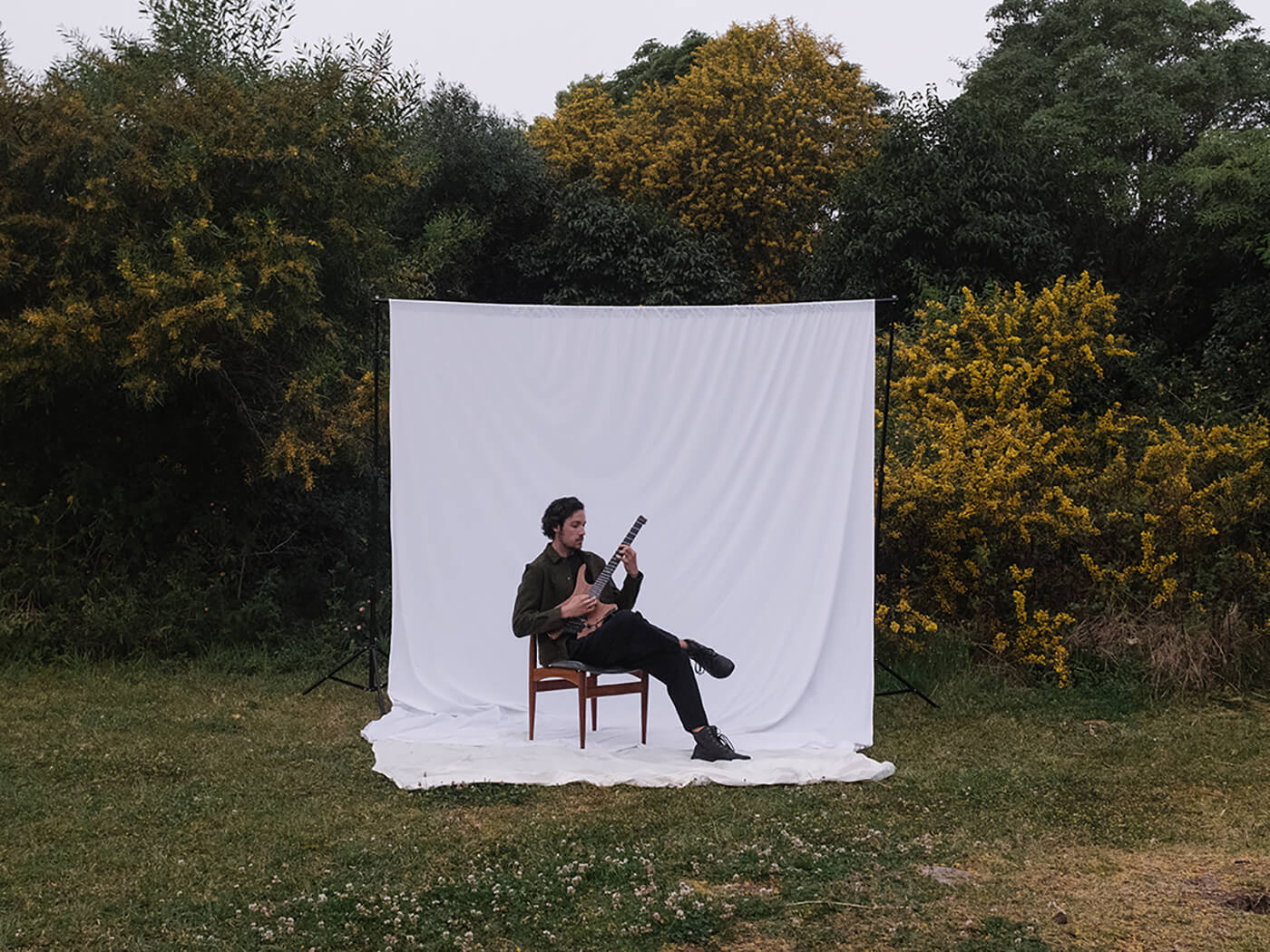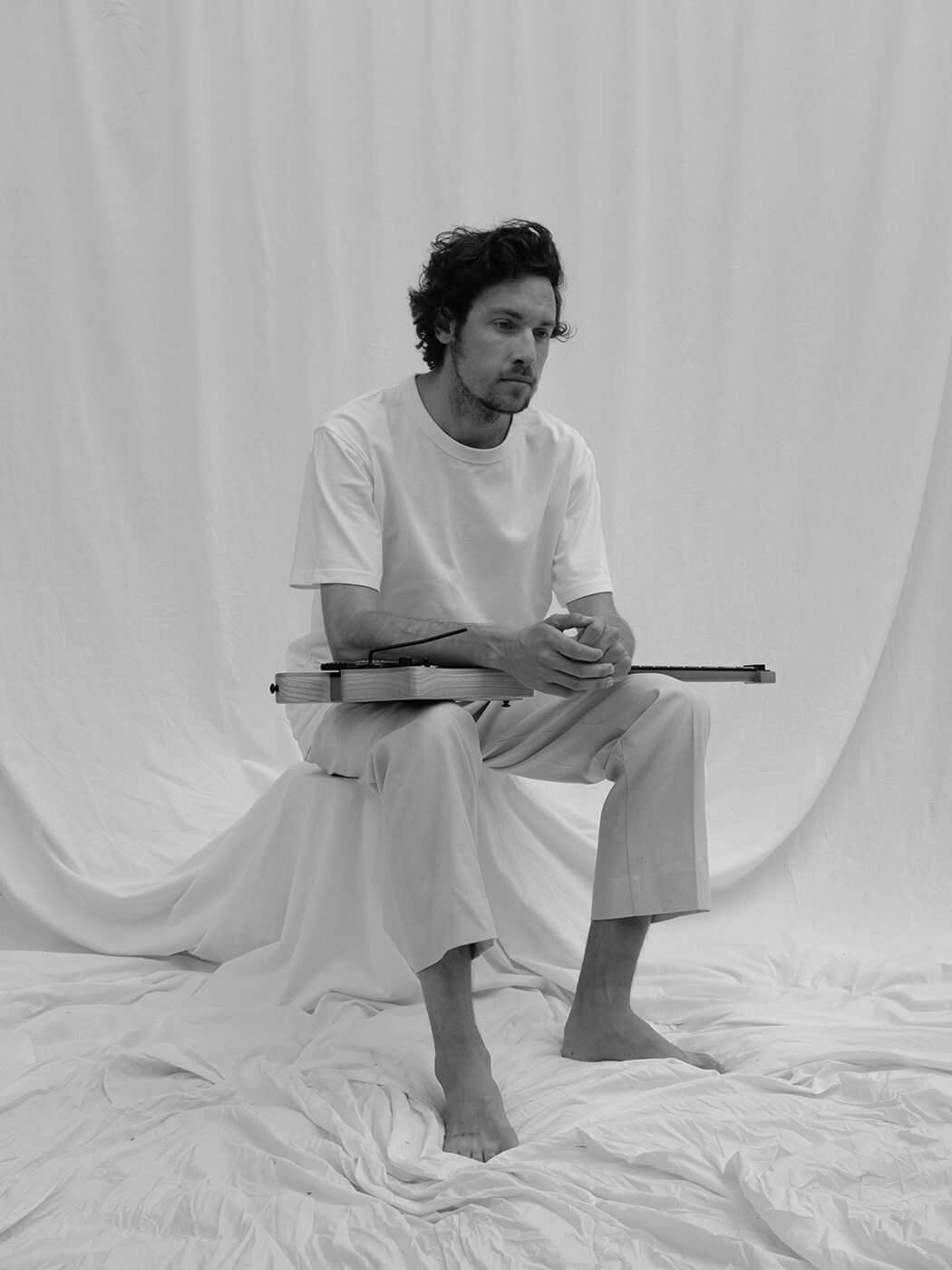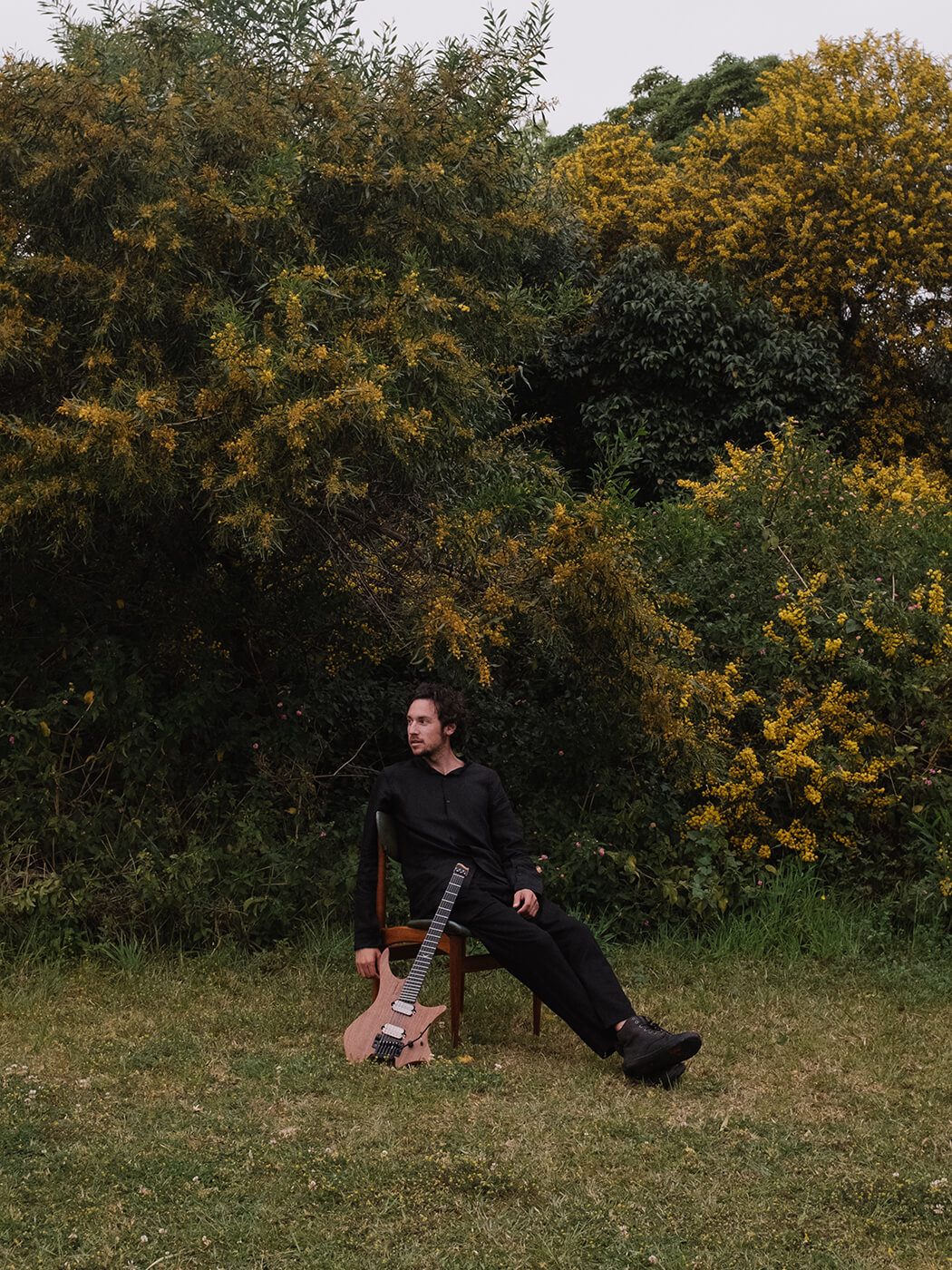Related Tags
Plini on new EP ‘Mirage’ and writing his most out-there music yet
The modern day guitar hero discusses how he wanted to “change the weather” in his songs, collaborating with Tosin Abasi and why his Neural plugin will continue to evolve with him.

Plini with his Strandberg guitar. Image: Chad Dao
Australian guitar maestro Plini may have carved out his name through dreamy, ethereal and tonally resplendent music, but on latest EP, Mirage, he’s let things get a little weird. He’s never been a guitarist to sit still and his innate need to explore new territories is more visceral than ever here.
“If I’m going to go in one direction, I want to go as far in that direction as possible,” says the guitarist via a Zoom call from New York, his most recent US run having just come to an end. “For the weirder stuff on the EP, I’ve been making sure it is genuinely weird, and a big part of that was in the string arrangements. I worked with A.J. Minette, who was the guitarist in The Human Abstract, and he’s really comfortable with things being wrong. So, the guitars and strings are slightly out of tune, the notes they play are not always in a direct key and the guitar tones are abrasive. I think it makes it intriguing.”
That desire to distort the bright textures and aesthetics of his trademark sound is clear on opening track, The Red Fox. Building on a foundation of skipping rhythms and supple fusion leads, through a shadowy, reverb-soaked lead tone and a subtle but unsettled underlay of strings, the song takes a much darker turn.
“There’s an Icelandic composer called Ólafur Arnalds who does a lot of arrangements where the strings are doing things a typical orchestra wouldn’t do,” Plini explains. “There’s stuff where the musicians are all playing the same note but at random times, which gives a swarming sort of sound. Strings don’t have to be super sweet, Hollywood movie type arrangements.”
Free As A Bird
Mirage represents his first new music – save for October’s surprise single 11 Nights – since 2020 album, Impulse Voices. With it, he’s embraced the freedom of the format. Indeed, the guitarist confesses he finds it “hard to write more than 20 minutes of instrumental music that’s compelling and different, from song to song. It’s a lot harder to say drastically different things when the lyric is a distorted guitar.
“But I find that the EP format is a really fun way to explore,” he adds. “It seems like it’s lower stakes than an album. It’s a chance for me to try different things and see what feels meaningful and fun. As a fan of music, if a band starts to repeat themselves, I lose interest. Seeing bands do drastically new things gets me excited, even if I don’t necessarily like all of their new directions.”
Conscious, too, of the limitations that instrumental music can often have when it comes to holding the listener’s attention, Plini admits to always being on the lookout for plot twists with which he can subvert listener expectations.

“That’s a big driver of how I write,” he muses. “In The Red Fox, the colours of the arrangement don’t change, it’s still drums, bass, rhythm, clean and lead guitar, and the guitar tones stay the same, so in those instances, the mood has to shift. That song goes from sweet harmony to more chromatic and darker sounds. Visually, if you’re sitting looking at an expansive view and it’s very bright, then suddenly clouds roll over and it starts raining. You’re still looking at the same view, but the weather has changed. I guess I’m trying to change the weather in my songs.”
From the crooked 7/4 snarl of Still Life, to Five Days of Rain’s overcast leads which warp out of tune and rumble like oncoming thunder, the EP’s five tracks are festooned with extra angularity and villainy. And yet, the dreaminess of his beloved Lydian scale is still present, smattering light amongst the din. It’s a scale he fell in love with through consuming insane amounts of Steve Vai and Joe Satriani as he was first getting into what he calls “crazy electric guitar music”, believing that its surreal aesthetic is what makes it so magic.
“I don’t know why it is, but the raised fourth just sounds like fantasy,” he says, his eyes lighting up. “If the natural fourth is the world we live in, then the raised fourth is a world where everything’s that little bit more colourful, which is a mood that I want to evoke most of the time.
“I have lots of covers that are not realistic, but contain recognisable things, just not necessarily in a real world way. But then Mirage is more abstract, and I think that’s something that I’m trying to do with the music as well. It’s like looking at a Picasso painting, and then thinking what it would sound like as music, like, how can we get abstract?”

Oud Of Luck
The aforementioned Still Life sees Plini play the oud, a stringed Middle-Eastern instrument: “I thought it would be fun to learn during lockdown, but it’s fucking impossible.” More importantly, however, the song also features a mouth-watering collaboration with Animals As Leaders’ Tosin Abasi. He too adds to the EP’s evil nature.
“He’s got a very specific twisted and angular voice, which is very different to mine,” he says of what Tosin brought to the track. “That’s important when there’s back-to-back guitar solos.
“Working together has felt relatively inevitable,” he admits. “He’s at the forefront of our generation of guitarists because he’s done the craziest stuff possible and he’s done so many new things compared to the generations before him, so of course I would want to collaborate with the best guitarist. And it’s a cool way to get a foot in the door and do more of this; I’d love to write a collection of songs with him.”
His latest release comes hot off the tail of a major update to his Neural DSP plugin, Archetype: Plini. The first of their revolutionary plugins to receive an update, it adds a host of new features, including fuzz, distortion and octave pedals alongside modulation effects. The features were lifted from plugins which followed in Archetype: Plini’s wake and, over time, have become a key part of his sound.
“When I toured with Animals as Leaders in 2016, they were playing Brain Dance and Javier [Reyes] had this amazing fuzz octave rhythm tone. Hearing that every night, I knew I needed to use that in my music. We tweaked the octave pedal from Archetype: Gojira, which I was using a lot, to be closer to the octave up and down which I have on my Quad Cortex for live. The plugin is a reflection of the tools that I like to use, so as I get more or different tools, the plugin should change too.”

Living Up To It
It feels like a long time since Steve Vai, a guitarist almost single-handedly responsible for his love of virtuosic guitar, hailed Plini as the “future of exceptional guitar playing”. But was such a mantle going to heap pressure on the laid back Aussie? Absolutely not.
“That was a very surreal thing to happen,” he reflects, “but it happened because I was making music for fun and I guess it resonated. To me, that was a sign to keep doing what I’m doing rather than to worry.
“I maybe feel a bit of pressure to play virtuosically at times,” he returns, “but it’s probably more subconscious. It happens because I love hearing the guitar played ridiculously, rather than because people that might expect it.”
Speaking of ridiculous guitar playing, the contemporary instrumental guitar landscape is rife with imagination and ingenuity. The likes of Tim Henson, Tosin Abasi, Manuel Gardner Fernandes, and Yvette Young are, in lieu of mindless acrobatics, proving that technicality and musicality can co-exist. It’s a scene Plini is proud to be a part of.

“It’s awesome being surrounded by so much evolution and talent; people keep coming up with things that I didn’t think would be possible. Whether it’s an Animals As Leaders or an Unprocessed song, there’s so much technicality but it’s still as emotional and catchy as a simple melody.”
So where does he fit into the picture? “I think we’re all trying to do the best version of our own thing. I’ve never been particularly into practising, so I don’t think my place is in pushing technique. But at the same time, I’m surrounded by these people who are so good at all these techniques, that it does push me to want to keep getting better and try new things that’s different to them, but also inspired by them. I want to incorporate all these crazy ideas into my music and create something that feels meaningful and interesting.”
Whilst Plini’s humility will always find him wanting to be better, his place within the upper echelons of the modern guitar scene is undisputed. He may be envious of Abasi’s innovation and Jakkub Zytecki’s “super wide vibrato,” but his ear for melodies wrought with colour and emotion is unmatched. With Mirage, he’s proved that, even when the scenes his music so vividly paints become stormy and tumultuous, his music remains as beautiful as ever.
Mirage is out now
